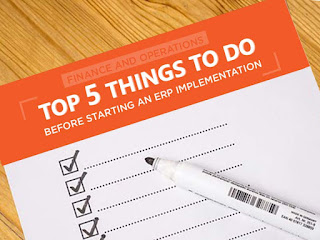Top Five Things To Do Prior To Beginning Your ERP Implementation
One of the high points of any digital transformation is the moment you’ve decided to replace your old legacy systems and consider ERP implementation. During the software selection stage of a project, chances are you’ve evaluated and maybe even already selected new systems with the potential of improving your business and making employees’ jobs easier. You’ve also likely come to the realization help is on the way and you can finally move into the 21st century with your enterprise software.

All this excitement and momentum can be a good thing and it’s important to have a solid plan on “how” to move forward. Too often, companies let the project momentum speed towards implementation without first assessing the situation, assembling a realistic implementation plan, corralling resources and doing a number of other things that need attention prior to commencing the implementation. To position you and your team for success, here are the top five things you should do prior to starting your implementation:
Validate the scope and timing of your ERP software purchase
Once you’ve decided on the best software solution(s) for your organization, it’s important to validate what exactly you’re purchasing. Too often, companies experience a disconnect between the software viewed during demos and the ones purchased via your software. Be sure you are purchasing the right modules, bolt-ons and user licensing types for your organization. Remember, you don’t have to buy all the software up front; you can always negotiate the timing of the purchases to coincide with your deployment schedule. One way to navigate the complexities of an enterprise software contract is to enlist the help of an independent, third-party ERP consultant to help negotiate an agreement that makes the most sense for you. ERP consultants are keenly aware of current software pricing and price flexibility (think discounts) that may not be offered when buying direct from a software vendor or reseller.
Source Your Internal and External Implementation Project Resources
Your software vendor sales rep may want you to start your project right away since doing so will optimize their compensation, but it’s important you only do so once you have the right team in place. There are a number of business, IT and consulting resource considerations (internal and external) to be identified and sourced prior to beginning. Roles and responsibilities should be defined for the program manager, internal and external project managers, organizational change leads, business leads and a host of other roles.
Build a Complete Implementation Project Strategy and Plan
Software implementations require focus, effort and planning well beyond what a system integrator, vendor or VAR can provide so it’s important to develop an implementation plan incorporating all the critical components required for success. Some of these components will come from your software vendor and you will want to augment these with critical tasks outside the purview of most ERP vendors and consultants. For example, organizational change management, business process improvement and program management are just three areas commonly overlooked. Be sure to enlist the help of agnostic, third-party consultants to help define/develop a well-honed implementation strategy and plan that’s the most suitable solution for your company’s unique situation.
Begin Key Implementation Critical Path Activities
Even though most ERP implementations take more time than expected, delays aren’t typically caused by technical or software issues. More commonly, there are other critical path activities delaying projects, even if the software is fully configured and tested. For example, issues related to people, business processes and data are much more likely to delay your project and create cost overruns than the software. It’s important to focus your early efforts less on software configuration and more on those critical path activities, such as data migration, organizational change planning and defining business process improvements.
5. Define your implementation project charter
Once all the above have been completed, a fifth area of focus should be to define a clear project structure and governance. Ensuring you have the right structure and controls in place, will enable you to optimize limited resources and maximize your ROI during implementation. A formalized project charter, including your plan, project roles, project governance and controls is the best way to accomplish this.
Considering most companies go ten or more years between major system updates or changes, ERP implementation experience is not usually a core competency. Recognizing this is not a weakness but a strength. An independent consultant like Panorama provides a unique value proposition. While clients often think of ERP consultants as software selection pros, the expertise goes much deeper. A few of the smart reasons for considering outside help include having a partner that can assist you with validating your overarching strategy, helping to predefine the business benefits, build the business case and help define KPIs. Enlisting the support you need during a complex ERP implementation can help you through the project, give you strategies to deal with the situation and give you a perspective you probably won’t otherwise have.


